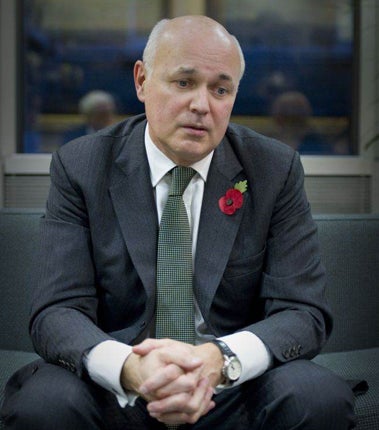Single parents should 'prepare for work' when child is a year old

Lone parents could lose some of their state benefits when their baby reaches the age of one if they refuse to prepare to get a job.
Unemployed single parents whose youngest child is aged between one and five could be caught by new sanctions aimed at persuading the workshy to take jobs rather than remain on benefits. But the move, outlined in a White Paper yesterday, ran into immediate criticism from children's charities and groups representing single mothers.
Outlining the biggest shake-up of the benefits system for 60 years, Iain Duncan Smith, the Work and Pensions Secretary, said that jobless people should begin preparing for work when their youngest child reached the age of one.
"People who are looking after children that are over one year old and under five will be expected to be keeping in touch with the jobs market; they will be expected therefore to stay in touch with Jobcentres, to come in now and then to discuss with them what will happen once their child goes to school and how they can make that happen," he said.
Mr Duncan Smith stressed that any financial sanctions imposed on this group would be "very, very low". Yesterday's White Paper said they could lose 20 per cent of their benefit for failing to attend a work-focused interview and an additional 20 per cent for not turning up for subsequent appointments.
When their youngest child reaches the age of five, they would face penalties if they did not actively seek work and make themselves available for it.
The Work and Pensions Secretary confirmed that the unemployed could lose their Jobseeker's allowance for up to three years if they repeatedly turned down the chance of a job and refused to apply for posts and do community work. He said: "Sanctions are not about hammering people. They are about sending a clear signal to those who are going through this process that if you co-operate, if you work with us, you will go through this quite happily and nothing will happen to you."
Ministers suggested that the penalties were also aimed at curbing a black economy estimated at £140bn a year in which some people claimed handouts while working and avoiding tax. Fraud and error in the benefits system is estimated at £5.2bn a year.
Nick Clegg, the Deputy Prime Minister, insisted that the sanctions were designed to deter but not "clobber" people: "I hope they are not used at all. I suspect that in practice they will be used for a tiny, tiny number of people who are really are abusing the system."
But Fiona Weir, chief executive of the parenting charity Gingerbread, said: "We are very concerned that single parents could face the threat of sanctions; most single parents want to work but find the odds heavily stacked against them, and the effect of financial sanctions would plunge children into unacceptable levels of poverty."
Sally Copley, head of UK policy at Save the Children, said: "It is hard to see how Britain's poorest children are going to be helped by using sanctions to create a climate of fear. It is children who will suffer when a single mum is told to take a job, but there is not suitable childcare available."
Sarah Jackson, chief executive of the Working Families group, said: "Taking money away from poor parents will not help meet child poverty goals. 'Good cause' to refuse a job must include a lack of appropriate childcare or hours that are not suitable for family life."
The universal credit will be introduced for new claims from 2013 and phased in for existing claimants over the next five years. They should ensure that people who move from welfare into work would keep at least 35p of every £1 they earn. Labour backed the idea of streamlining the benefits system but questioned whether there would be enough jobs.
Emergency hardship payments on which claimants rely while their benefits are stopped could be turned. Into loans. The White Paper said: "We are considering replacing the current system of hardship payments with loans to the extent that is possible. We also want to consider ways of ensuring that those who persistently fail to meet the requirements imposed upon them cannot rely on these alternative sources of support for the entire duration of their sanction."
Join our commenting forum
Join thought-provoking conversations, follow other Independent readers and see their replies
Comments
Bookmark popover
Removed from bookmarks